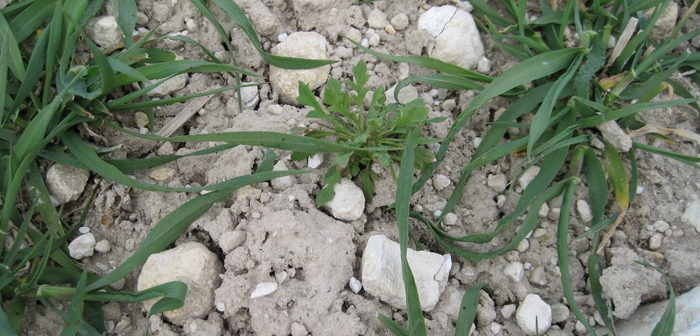Winter cereals growers should not ignore broad-leaved weeds after reports of populations breaking through early applications of residual chemistry.
Two common scenarios have been identified by Dow AgroSciences’ field teams, according to the company’s cereals herbicide specialist Stuart Jackson.
“Generally speaking the first application of flufenacet-based residual herbicides targeting autumn germinating grassweeds have been applied in a timely way to winter cereals, often within 24 hours of drilling,” Mr Jackson said.
“But we are seeing a significant number of examples where residual chemistry has been compromised by poor seed beds and dry conditions.
“Fields with a lower grassweed pressure have dropped down the priority list and most are yet to be sprayed. However, these fields are the most likely to experience a flush of autumn germinating weeds.
“Depending on the date of drilling, these weeds could have three or even four leaves – well beyond a growth stage that can be controlled by residual herbicides alone.”
On the ground, Dow’s regional teams are reporting populations of cranesbill, poppy and fool’s parsley emerging, along with volunteer oilseed rape and beans.
Where conditions allow, there is still an opportunity for growers to tackle any issues they have this year, rather than waiting until spring.
Mr Jackson suggests growers consider adding a compatible contact-acting herbicide which performs in cold and variable temperatures when topping up on residuals in the coming days and weeks.
He said: “Growers are now heading back in to crops to top up residuals and it is a good idea to add a contact-acting herbicide with autumn approval to take these weeds out.”
Two herbicides proven to act on broad-leaved weeds in cold and variable conditions are Spitfire and Zypar.
Spitfire (fluroxypyr + florasulam) can be applied from growth stage 13 in fields where volunteer beans, brassica weeds, groundsel and mayweeds are a problem.
This is the first autumn that Zypar is available to growers after being launched in March.
“Based on Arylex Active (halauxifen-methyl) Zypar controls a wider weed spectrum than Spitfire, covering off Cranesbill, Poppy and Fool’s Parsley,” Mr Jackson added.




